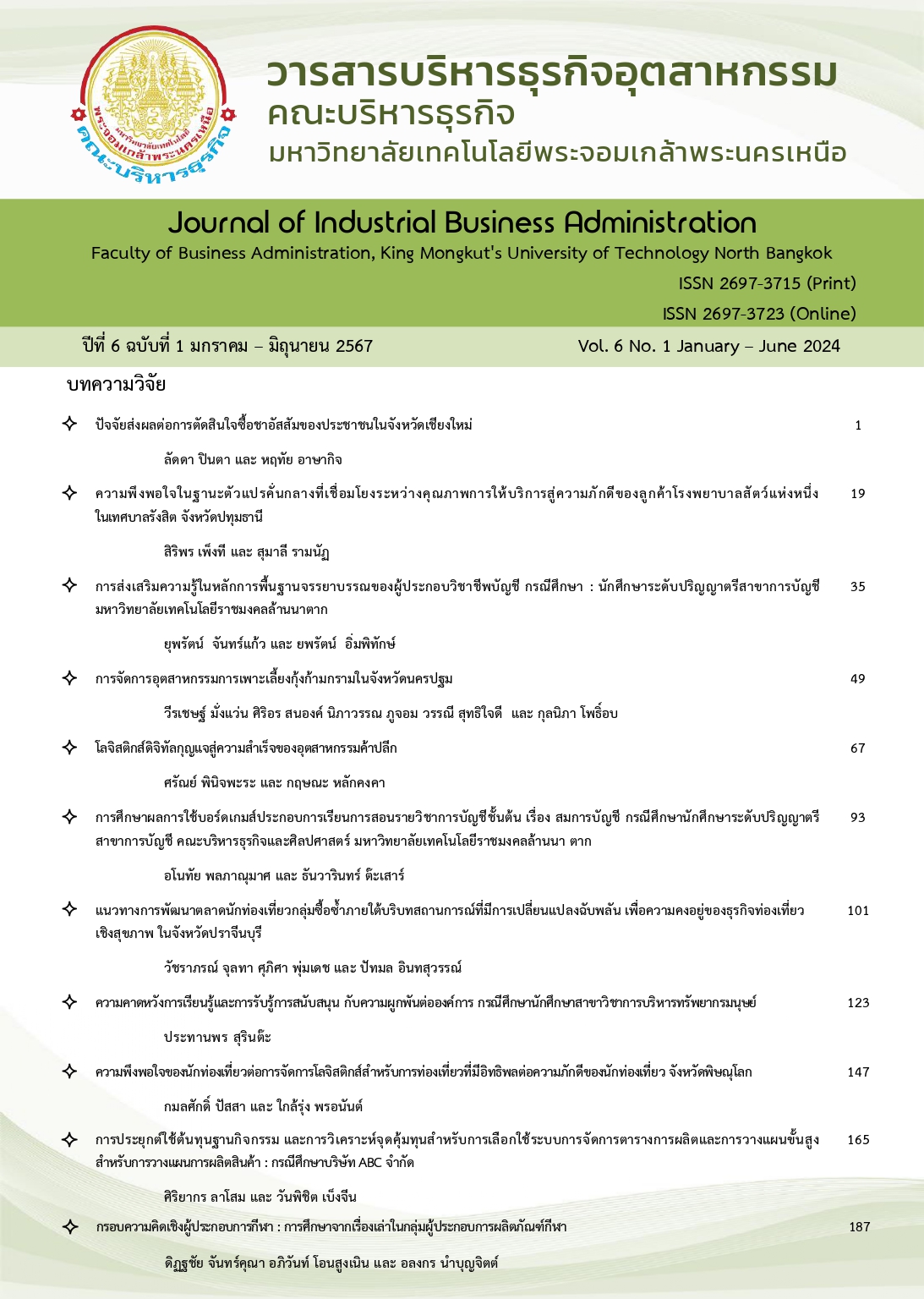A study of the results of Using Board Games for teaching and learning an Introduction to Accounting-on-Accounting Equation: A Case Study of Accounting Students of Faculty of Business Administration and Liberal Arts, Rajamangala University of Technology Lanna Tak
Keywords:
Board games, accounting equations, Transaction analysisAbstract
The objectives of this research are (1) to compare academic achievement in accounting at the entry level; Using accounting games with a criterion of 80 percent (2) to study satisfaction by using soccer games to support the teaching of elementary accounting principles. Accounting The sample used in this study was undergraduate students in the field of accounting. Faculty of Business Administration and Liberal Arts Rajmangala Lanna Tak University of Technology, 203 people. Materials used include: Board games for teaching basic accounting techniques. Test of achievement of account balance and satisfaction survey scale used for descriptive analysis also used t-test. The research results found that Academic achievement using board games in the elementary accounting subject. Accounting equations After studying above the threshold of 80 percent at the statistical significance level of 0.010
and 0.050, the level of satisfaction with the use of board game media. For first-year accounting students, it was at a high level with a mean of 4.338 and a standard deviation of 0.795.
References
สำนักงานคณะกรรมการการศึกษาแห่งชาติ. (2560). แผนการศึกษาแห่งชาติ - พ.ศ. ๒๕๖๐ – ๒๕๗๙.กรุงเทพฯ: พริกหวานกราฟฟิค.
ประหยัด จิระวรพงศ์. (2558). Games Based Learning: สื่อการเรียนรู้รูปแบบใหม่ของไทย. [ออนไลน์]. Available: http://nuybeam.blogspot.com/2010/08/game-based-learning.html [สืบค้นเมื่อวันที่ 23ตุลาคม 566]
Accountclub. (2019). สมการบั ญ ชี . [ออนไลน์ ]. Available : https://www.myaccountcloud.com/Article/Detail/88128/สมการบัญชี [สืบค้นเมื่อ วันที่ 25ตุลาคม 2566]
ทรรศนภรณ์ เทพภูธร, สัญชัย พัฒนสิทธิ์, & ไพฑูรย์ ศรีฟ้า. (2565). การพัฒนาบอร์ดเกมการศึกษาความเป็นจริงเสริมสำหรับการเรียนรู้โดยใช้เกมเป็นฐานเพื่อส่งเสริมผลสัมฤทธิ์ทางการเรียนของนักเรียนระดับชั้นประถมศึกษาปีที่ 3. วารสารการวัดผลการศึกษาสำนักทดสอบทางการศึกษาและจิตวิทยา, 39(105), 64-75.
บุญชม ศรีสะอาด. (2560). การวิจัยเบื้องต้น (พิมพ์ครั้งที่ 10). กรุงเทพฯ: สุวีริยาสาส์น.
อนุศร หงษ์ขุนทด. (2023). แนวทางการออกแบบการสอนโดยใช้เกมเป็นฐาน (Game-based Teaching). [ออนไลน์].Available: http://krukob.com/web/news-81/ [สืบค้นเมื่อ วันที่ 10 ตุลาคม 2566].
Ezezika, O., Fusaro, M., Rebello, J., & Aslemand, A. (2023). The pedagogical impact of board games in public health biology education: the Bioracer Board Game. Journal of Biological Education, 57(2), 331-342.
] Sousa, M. (2023). Mastering modern board game design to build new learning experiences:the MBGTOTEACH framework. The International Journal of Games and Social Impact, 1(1), 68-93.
ชนันภรณ์ อารีกุล. (2563). การพัฒนานวัตกรรมการเรียนรู้แบบเกมกระดานเพื่อเสริมสร้างความเป็นพลเมืองที่เข้มแข็งของนิสิตระดับปริญญาตรี. วารสารปัญญาปณิธาน, 5(2), 137-150.
ทิพรัตน์ สิทธิวงศ์. (2564). การศึกษาผลของการใช้บอร์ดเกมเพื่อส่งเสริมการเรียนรู้ สำหรับนิสิตระดับปริญญาตรีคณะศึกษาศาสตร์ มหาวิทยาลัยนเรศวร.วารสารศึกษาศาสตร์ มหาวิทยาลัยนเรศวร, 23(4), 187-200
Downloads
Published
How to Cite
Issue
Section
License
Copyright (c) 2024 Journal of Industrial Business Administration

This work is licensed under a Creative Commons Attribution-NonCommercial-NoDerivatives 4.0 International License.



